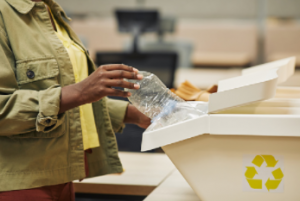If you’re wondering what the Best Bottle recycling depot is, you’ve come to the right place. This facility collects bottles and cans for recycling. Their services have several benefits: they pay a small fee to process bottles and cans, recycle more materials, and charge lower handling fees.
 3.5-cent handling fee
3.5-cent handling fee
The state legislature is weighing whether to increase the handling fee from 3.5 cents to a dime for bottles. The environmental group Citizens Campaign for the Environment is pushing for the increase, saying that it will encourage more businesses to collect bottles and containers for recycling. The state’s bottle bill has been under-served by retailers recently, and the rate dropped below 50 percent last year. The environmental group also calls for the inclusion of wine, liquor, and nips in the program.
Higher rate of recycling
While beverage industry representatives agree that more bottles should be recycled, fundamental differences between the two sides of the debate linger. These disagreements relate to the market for returned containers and who gets access to them. The beverage industry has long supported a 10-cent bottle deposit. However, some state laws do not include the 10-cent deposit.
While the new law does not mandate a bottle deposit, recycling industry representatives argue that these schemes encourage consumers to throw bottles into their curbside bins, not recycling bins. AB 1454, backed by Californians Against Waste, seeks to increase payments to existing bottle recycling depots.
The deposit system helps consumers recycle more bottles while reducing their carbon footprint. In addition, it reduces the number of fossil fuels required to produce new bottles. Many beverage companies will offer a long-term contract for recycling. Bottle recycling services are also available from private companies. Some companies even recycle reusable plastic bottles into reusable PET granules.
The deposit return system is another factor in high recycling rates. For example, a deposit return system that accepts more types of drink containers tends to achieve better rates.
Reuse of bottles
Plastic bottles are often made from #7 plastic. These bottles contain BPA and can leach into food and liquid. While reusing them at a bottle recycling depot may not be the most environmentally-conscious thing to do, it is important to recycle them. It can help protect the environment and your health.
Some municipalities and other governments have introduced deposit return schemes for bottles. It will help make bottle recycling easier. However, some countries have yet to implement such a program. Many environmental groups are working on expanding the scheme to cover all kinds of bottles. It will benefit the environment and the community.
Recycling plastic bottles is an excellent way to reduce the amount of trash in landfills. The process will also help the environment by cutting the consumption of fossil fuels that would otherwise be required to make new bottles.
Cost
Bottle recycling is an essential part of the beverage industry’s sustainability plan. The beverage industry has invested in programs encouraging recycling and providing education about the importance of doing so. For example, Coca-Cola has provided funding for elementary schools to host recycling parties, lending money to companies that process used plastic. It also supports organizations like Keep America Beautiful and organizes litter cleanups
In recent years, major beverage companies have pledged $100 million to support recycling, and they’re launching their programs. These efforts aim to increase public awareness, modernize the infrastructure, and encourage more people to recycle. One of the most important goals is to reduce the amount of plastic in the environment. Manufacturers have committed to helping to recycle efforts by adopting a policy called extended producer responsibility (EPR), which requires them to support the program financially. Some recycling programs have partial or complete EPR, which helps them obtain higher quality plastic.
One of the significant problems with the bottle bill is that it deprives the recycling industry of valuable scrap. This scrap would help offset the processing costs of less valuable items. This argument gained more credence after China imposed limits on plastic scrap imports. But, unfortunately, it resulted in a glut of used paper and plastic in the country.
